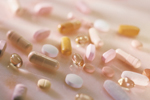 In the ongoing efforts to improve quality of life in cancer patients, some supplements have shown promise in battling two troublesome side effects. One of those effects is called “cachexia,” or wasting syndrome, and the other is “lymphedema” or fluid retention. Let’s see what natural health has to say about these.
In the ongoing efforts to improve quality of life in cancer patients, some supplements have shown promise in battling two troublesome side effects. One of those effects is called “cachexia,” or wasting syndrome, and the other is “lymphedema” or fluid retention. Let’s see what natural health has to say about these.
Cachexia is the muscle wasting that often accompanies muscle weakness and lack of appetite. Patients with cancer-related cachexia experience gradual loss of body weight, reduced muscle, and fatty tissues as well as lack of appetite. Moreover, cancer cachexia negatively impacts patients’ quality of life, and survival.
This condition is the result of inflammatory, tumor-derived chemicals known as “cytokines” and “catabolic hormones,” leading to appetite suppression and breakdown of muscle and fat. It is seen in up to 80% of patients with end-stage disease.
Omega-3 fatty acids have been shown in studies to reduce inflammation and factors that can raise the risk of cancer. A recent meta-analysis was performed by researchers in Spain. Out of 17 published studies, eight were considered to be of high-quality. These researchers concluded:
— Oral supplements with at least 1.5 grams a day of n-3 fatty acids definitely benefited patients with advanced cancer and loss of body weight, especially in cancer of the stomach and pancreas.
— Health benefits included: weight gain, improved appetite, improved quality of life, and reduced post-operative complications.
— Patient tolerance is improved if administered with low-fat formulas for at least eight weeks.
Lymphedema is fluid retention due to a blocked lymphatic system. Swelling in the limbs and elsewhere in the body is seen. It is the result from cancer itself or after treatment with radiation or surgery. Lymphedema occurs in up to 50% of breast cancer patients who undergo radiotherapy after radical mastectomy, as compared to 25% of those without radiotherapy. According to the National Cancer Institute, other cancer patients at higher risk for lymphedema include those who underwent surgery with or without radiotherapy treatment for the following cancers: liver, pancreas, colorectal, testicular or prostate, or ovarian cancer, or melanoma of the upper or lower extremities.
Preliminary results from small studies show promise in the treatment of lymphedema. Here are your best bets so far:
— Selenium (300 mcg a day) reduced lymphedema in breast and head and neck cancer.
— Flavonoid fraction (1,000 mg a day) reduced postmastectomy lymphedema.
— Grape seed extract (100 mg three times a day) reduced radiation-induced edema.
— Gingko formula reduced upper limb edema following breast cancer treatment.
